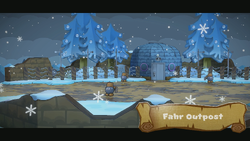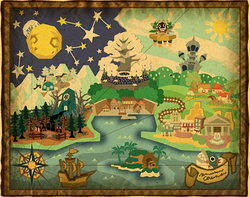Fahr Outpost: Difference between revisions
No edit summary |
(Delete unnecessary words) Tag: Mobile edit |
||
| Line 72: | Line 72: | ||
==Names in other languages== | ==Names in other languages== | ||
{{foreign names | {{foreign names | ||
|Jap=サイハテ{{ruby|村|むら}} | |Jap=サイハテ{{ruby|村|むら}} | ||
Revision as of 12:38, August 24, 2024
| Fahr Outpost | |
|---|---|

| |
| First appearance | Paper Mario: The Thousand-Year Door (2004) |
| Latest appearance | Paper Mario: The Thousand-Year Door (Nintendo Switch) (2024) |
| Greater location | Rogueport's surrounding areas |
| Ruler | Fahr Outpost mayor |
| Inhabitants | Bob-ombs, Fred, General White, Gob, Nob, Rob, Swob |
- “This is Bob-omb village, DA-BLOOIE! There is nothing here, DA-BLAMMO!”
- —Nob, Paper Mario: The Thousand-Year Door
Fahr Outpost is an icy village that Mario and his partners can access from Path to Fahr Outpost in the game Paper Mario: The Thousand-Year Door. It is home to many Bob-ombs, including General White. Fahr Outpost is located in an icy region far away from Rogueport. The outpost consists of several buildings and houses, all of which look like bunkers. The area resembles the Far North region of Russia, with the indigenous Bob-ombs displaying Russian-inspired accent and headwear. There are stone walls around the outpost, most of which are cracked and have barbed wire over them. The Bob-ombs here dislike foreigners, particularly non-Bob-ombs. In Paper Mario: The Thousand-Year Door, it is Admiral Bobbery's presence in Mario's party that helps build trust between Mario and the Bob-ombs.
Mario and his allies must get Goldbob's permission to use Big Bob here to get to the moon. There is a small statue of a cannon at the end of the outpost, but the real cannon is in a massive underground chamber. The first building in the area is always locked. It is the cannon's control center.
"Fahr" is word play on Fahrenheit, in reference to the area's cold climate, and far, in reference to the location's distance from Rogueport. "Fahr Outpost" could also be a play on the phrase "far out," a term that describes something as being extreme or radical.
Inhabitants
Bob-ombs are by far the largest portion of the population.
Main Story
During Chapter 7
Items
| Item | Location |
|---|---|
| In the east area; behind the stairs in front of the inn. | |
| In the east village scene; on the ground to the right of General White's house. | |
| Given by Swob for doing his trouble. | |
| In the east area of the village, it appears on the left chair every time Mario sleeps at the inn. | |
| In the west village scene; in the wall corner in the southwest. | |
| In the east village scene; behind the boxes in General White's house. | |
| In the east village scene; under a panel to the left of the cannon statue. |
Other items are on sale at the Northwinds Mart item shop.
Profiles
Tattles
- "This is a part of Fahr Outpost. It's a village full of Bob-ombs. How do they survive out in this cold anyway? Don't their fuses freeze off? You'd think these people would be bitter, living here... But they all look just fine!"
- "This is part of Fahr Outpost. There's a shop and an inn here, so that's something... They have a huge, cannonlike monument over there, too. Very Bob-ombish!"
Map description
- A village of Bob-ombs in a mountainous region that is snowbound year-round. It's a place so cold it'll freeze your breath, but it has heartwarming shops and inns (GCN) / a heartwarming shop and a cozy inn (Switch).
Gallery
Names in other languages
| Language | Name | Meaning | Notes |
|---|---|---|---|
| Japanese | サイハテ Saihate Mura |
Farthest Village | |
| Chinese (simplified) | 边境之村[?] Biānjìng zhī Cūn |
Border Village | |
| Chinese (traditional) | 邊境之村[?] Biānjìng zhī Cūn |
Border Village | |
| Dutch | Guurlanden[?] | From guur (bleak, cold) and landen ("land") | |
| French | Perduvostok[?] | Perdu means "lost", while the "vostok" suffix is derived from Vladivostok | |
| German | Großfrostheim[?] | Pun on Großostheim, the former residence of Nintendo of Europe, and "frost". | |
| Italian | Bomburgo[?] | From bomba ("bomb") and the common city suffix -burgo | |
| Korean | 땅끝 마을[?] Ttang-kkeut Ma'eul |
The End of the Earth Village | |
| Spanish | Bomburgo[?] | Like the Italian name |
Trivia
- Unlike other locations in the game, Mario does not have to place the previous Crystal Star (the Garnet Star) at The Thousand-Year Door to visit Fahr Outpost, but he cannot progress onwards to the moon until then.
- Most of the characterizations of the Bob-ombs in the village, the environment, and their use of a secret weapon and wanting to closely guard it from enemy usage, are similar to the Cold War, specifically Soviet Russia. In the Official Nintendo Power Player's Guide for The Thousand-Year Door, the commentary stated "Considering most of the Bob-ombs speak with Russian accents, those of you who grew up in the '60s may feel a bit nervous when you see the enormous weapon rise from a silo. Resist the urge to hide under a desk and tuck your head between your legs.",[1] referring to a standard method during the early Cold War of trying to evade a nuclear attack, called duck and cover, as well as the events of the Cuban Missile Crisis.
- On a similar note, the Bob-ombs at Fahr Outpost incorporate "Da" into their explosion tics in speech, referring to a common reply in Russian. The English version of the Switch remake omits the "Da" from their dialogue, possibly in light of Russia's invasion of Ukraine at the time of the game's release.
References
- ^ Thomason, Steve (October 1, 2004). Paper Mario: The Thousand-Year Door Nintendo Player's Guide. Nintendo of America (American English). ISBN 1-930206-51-8. Page 75.

